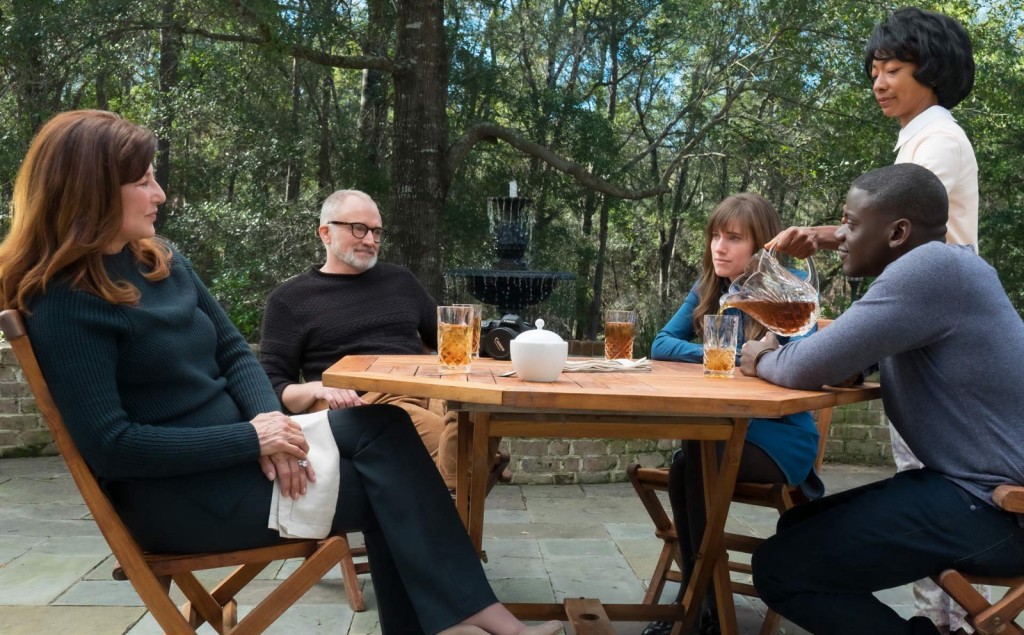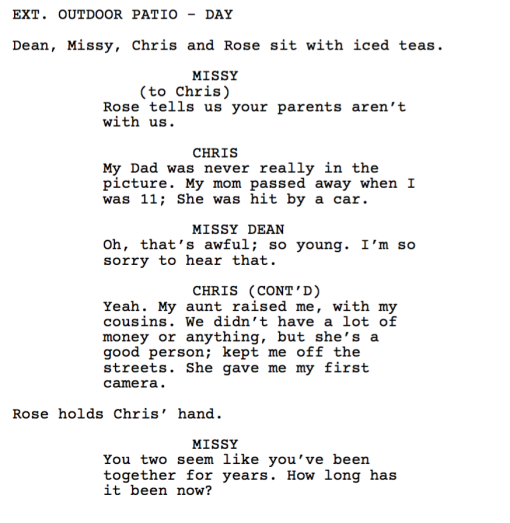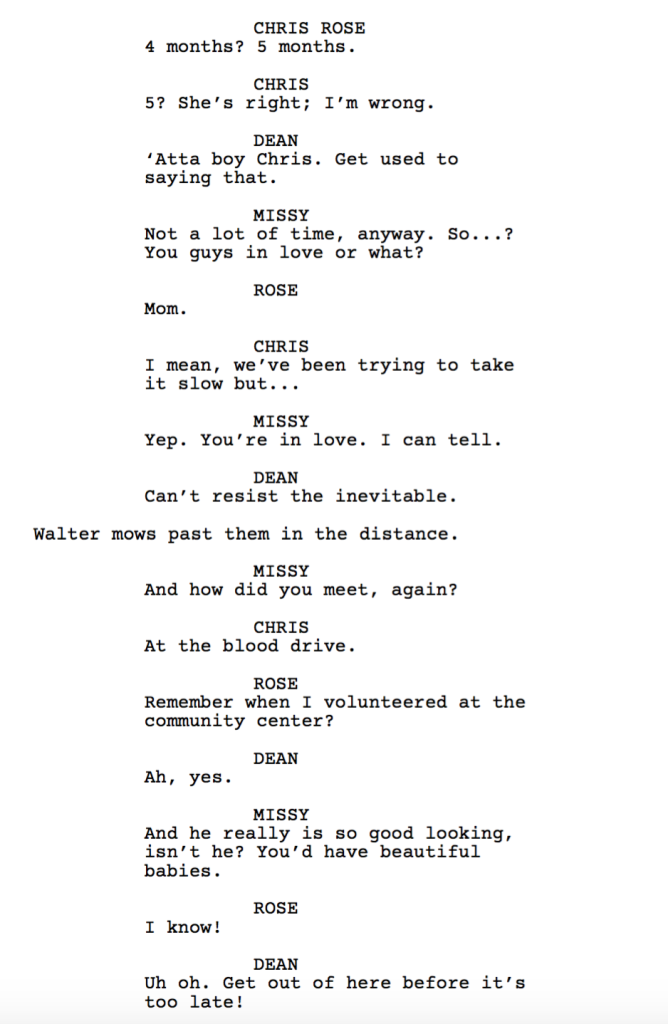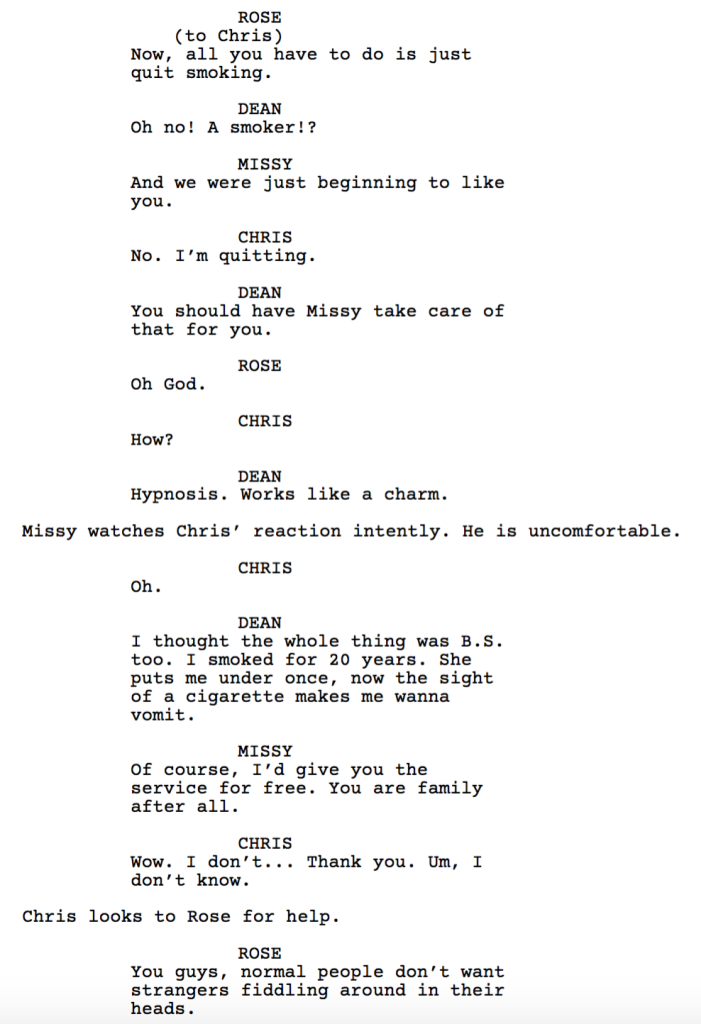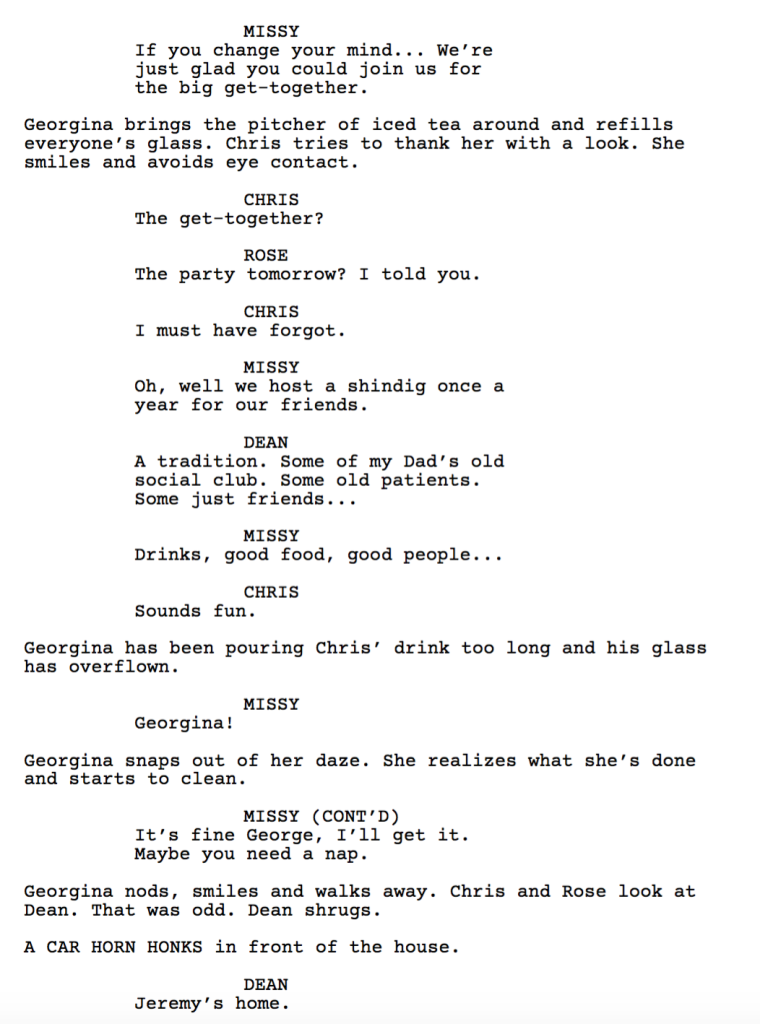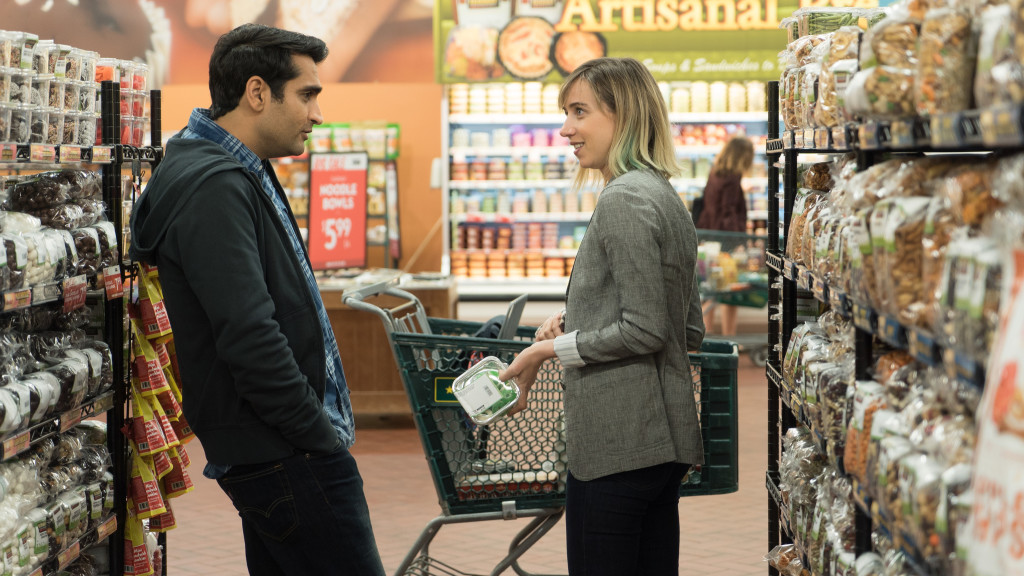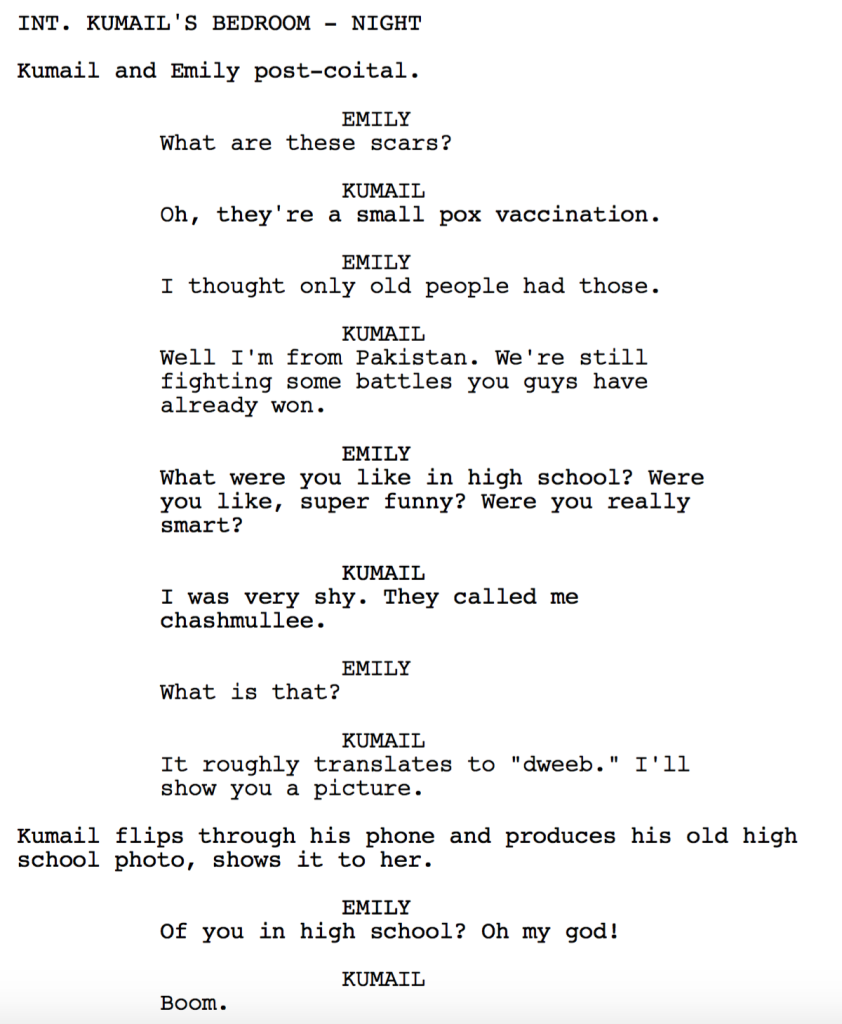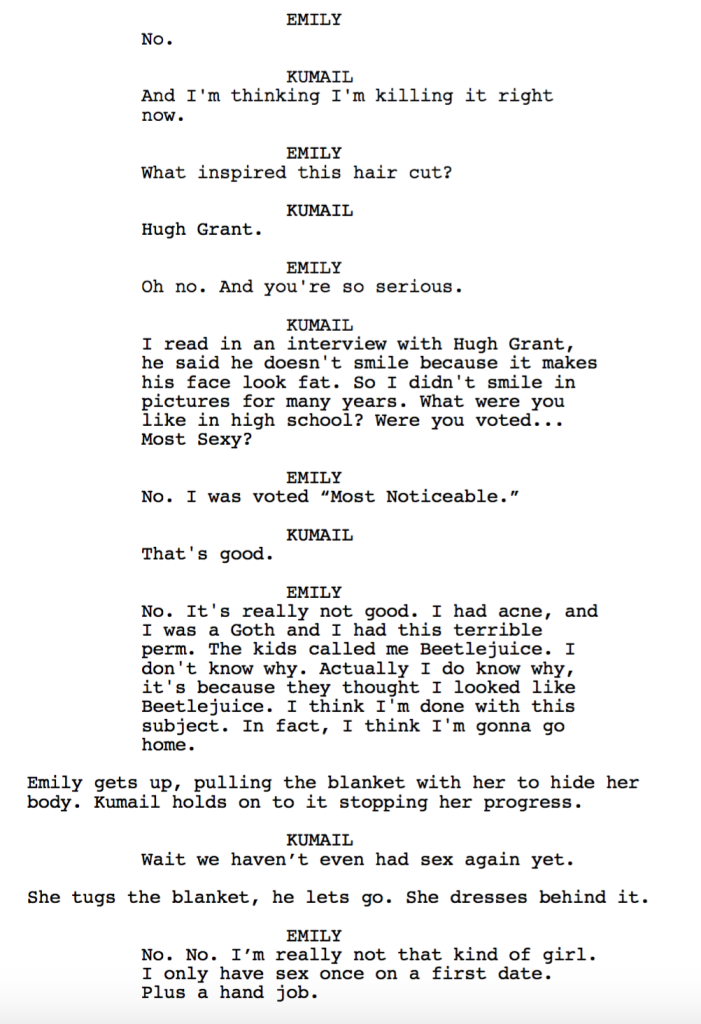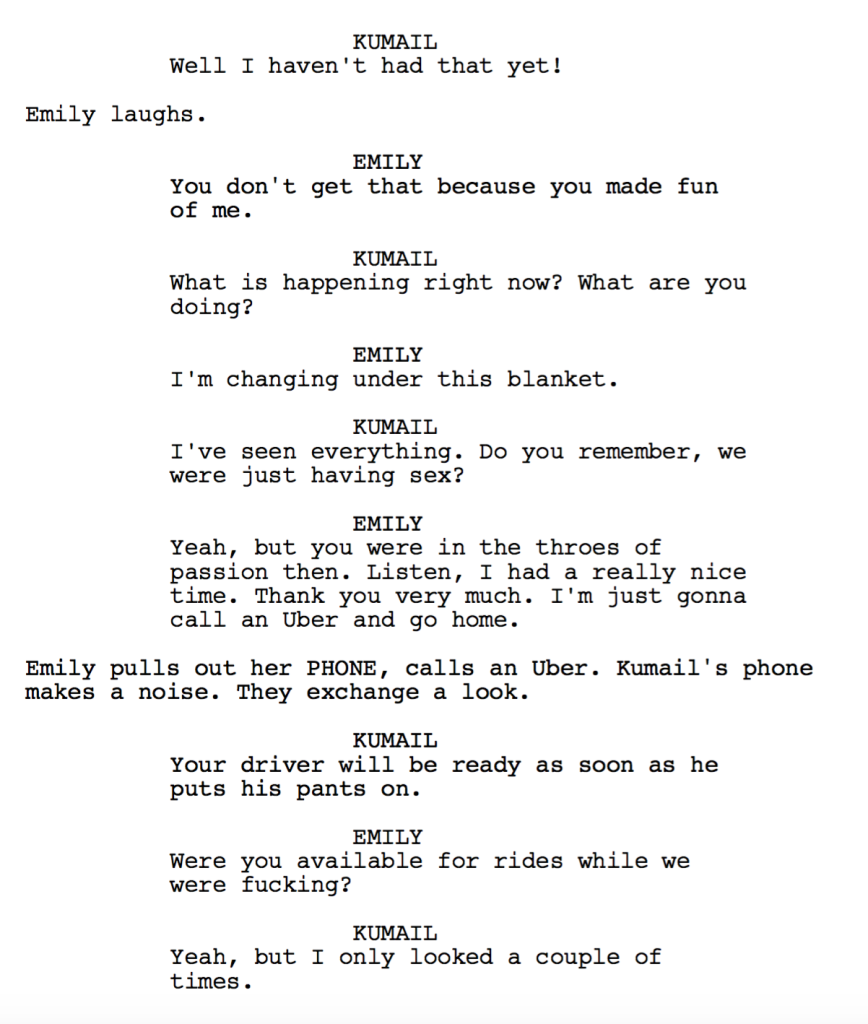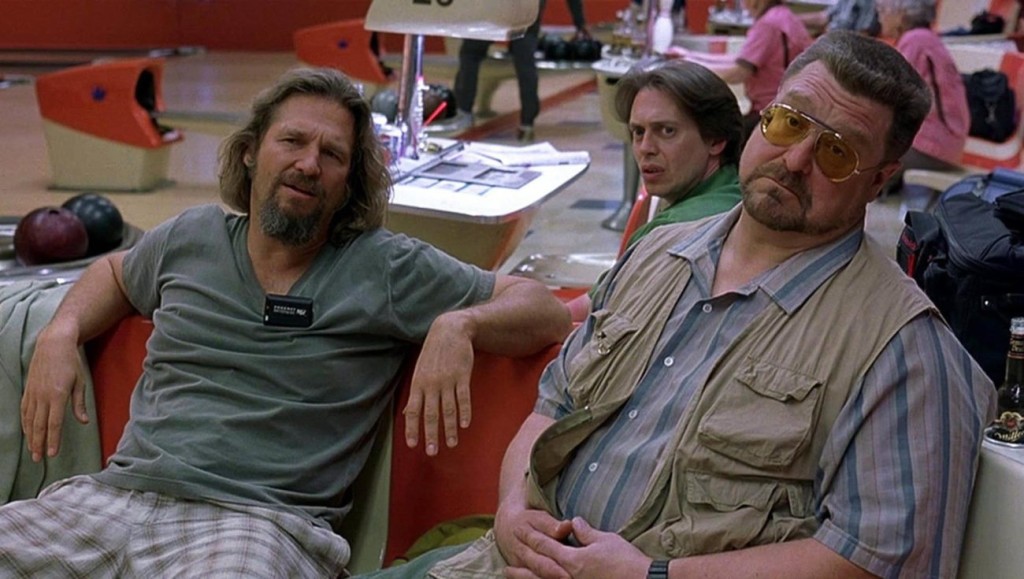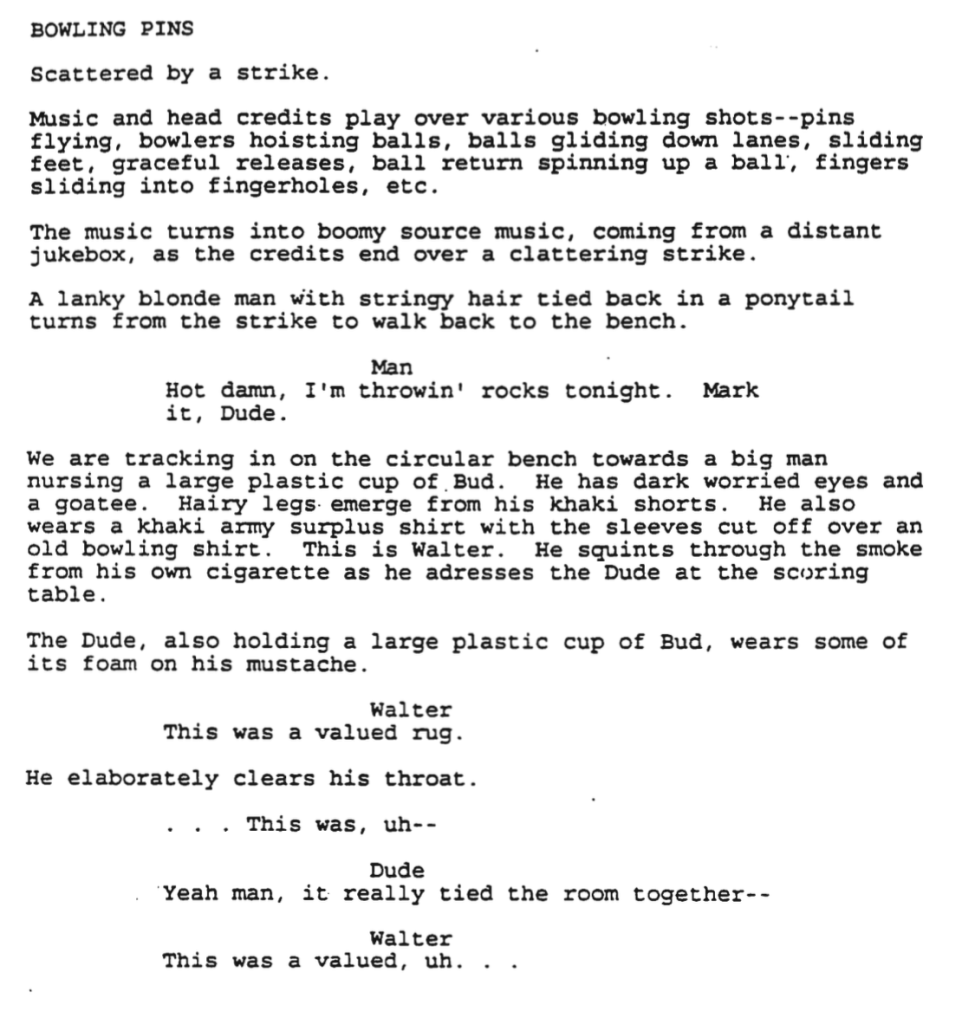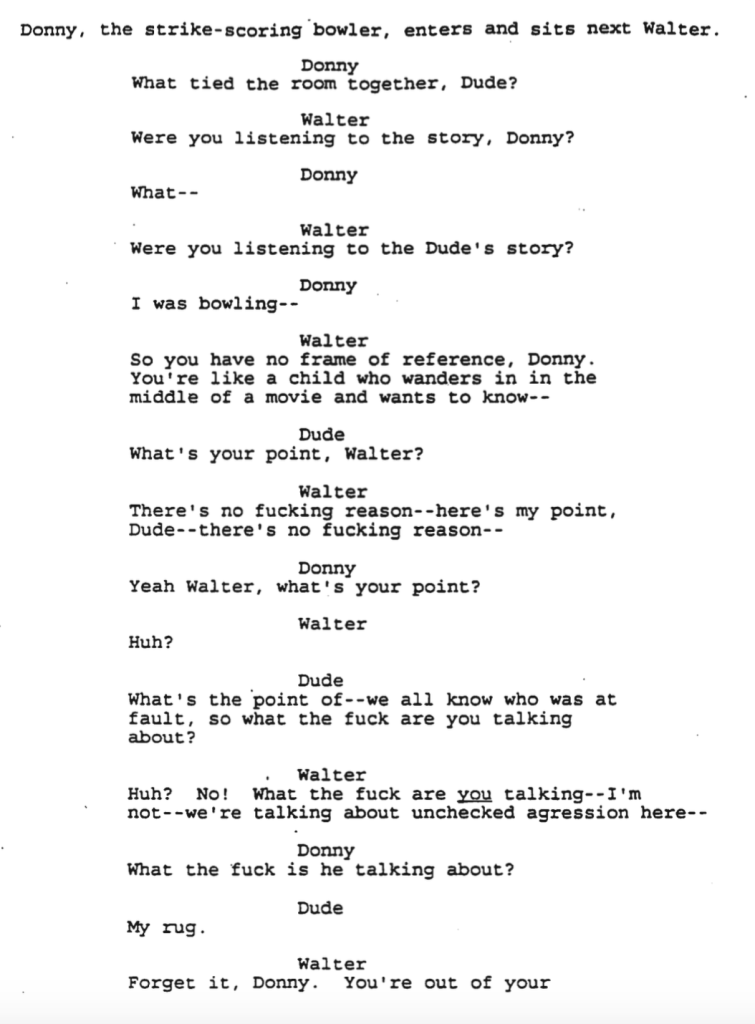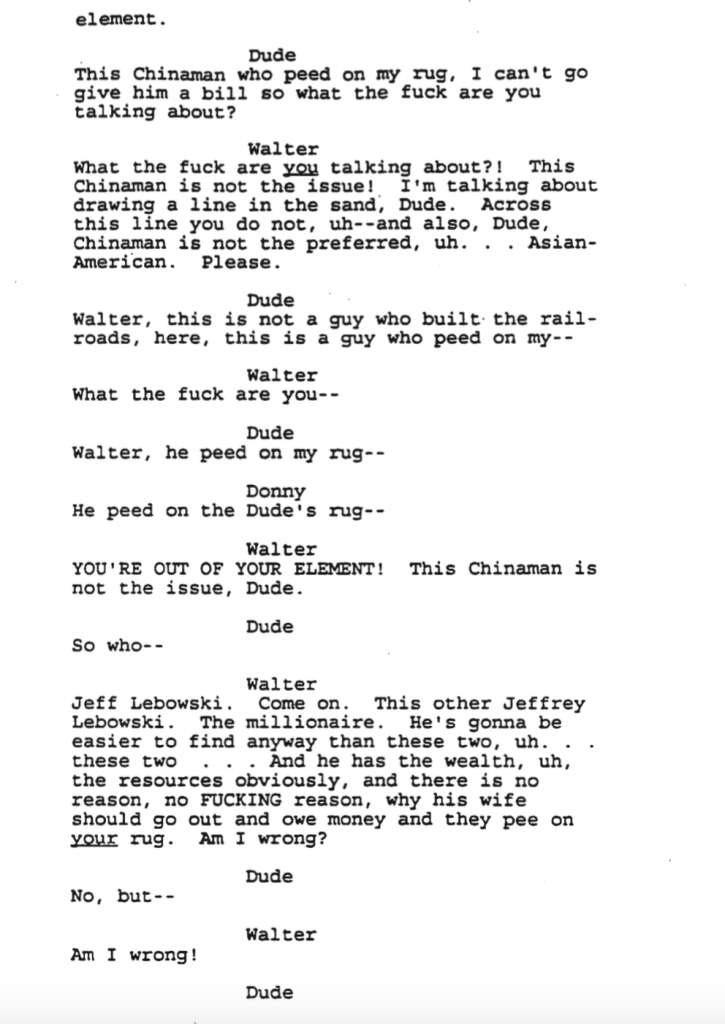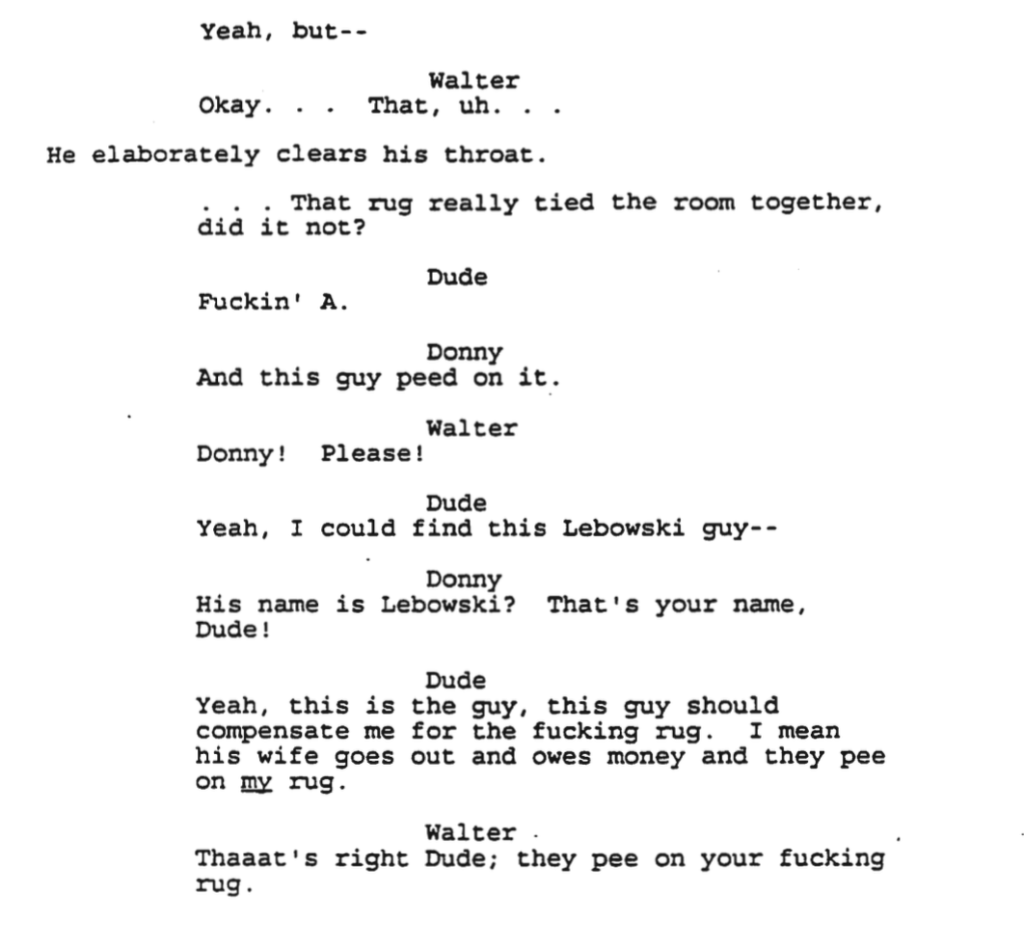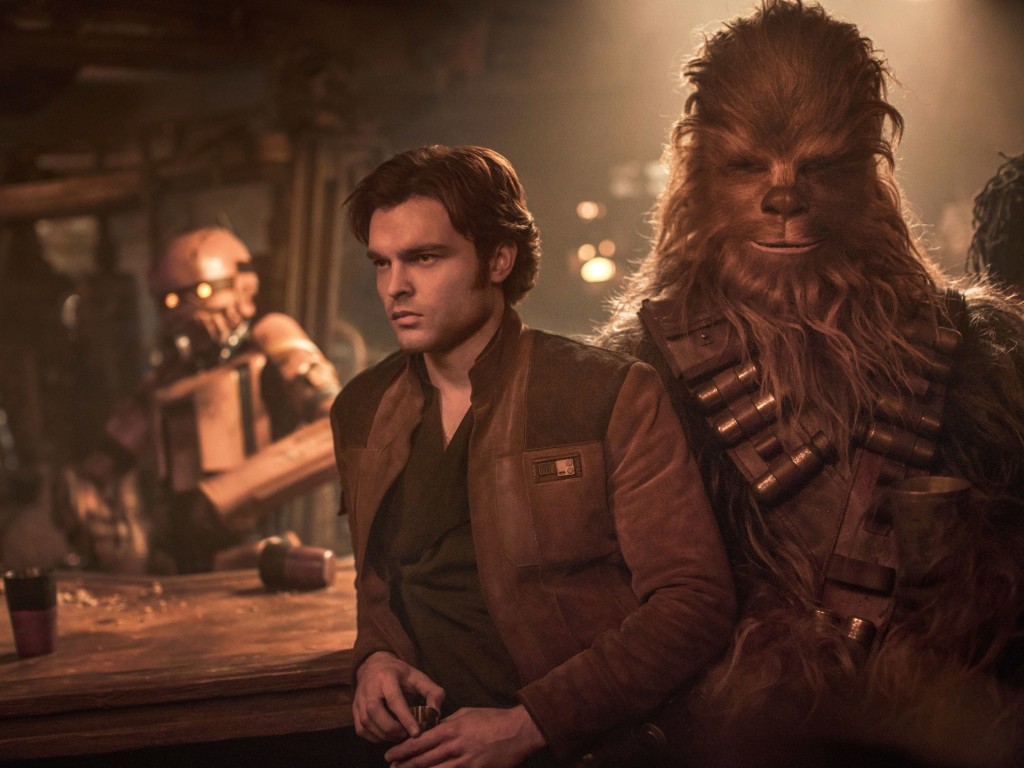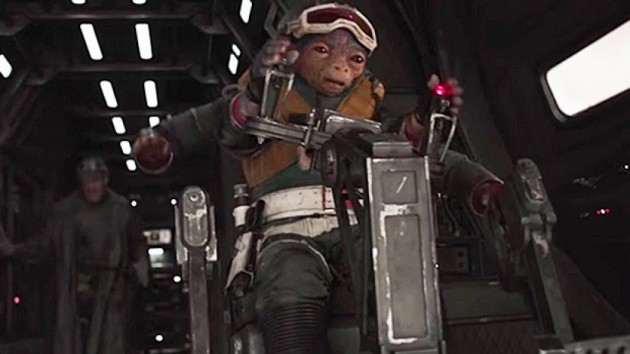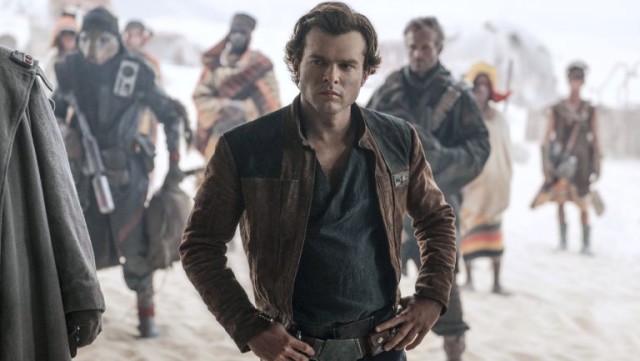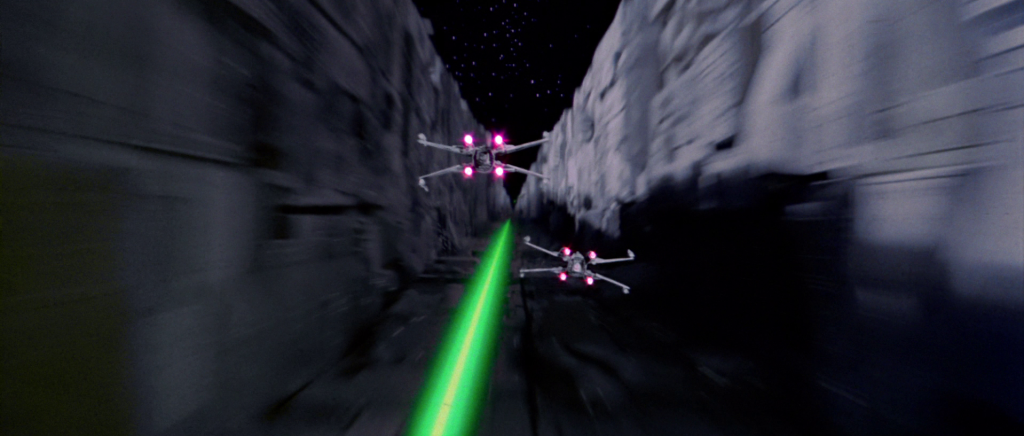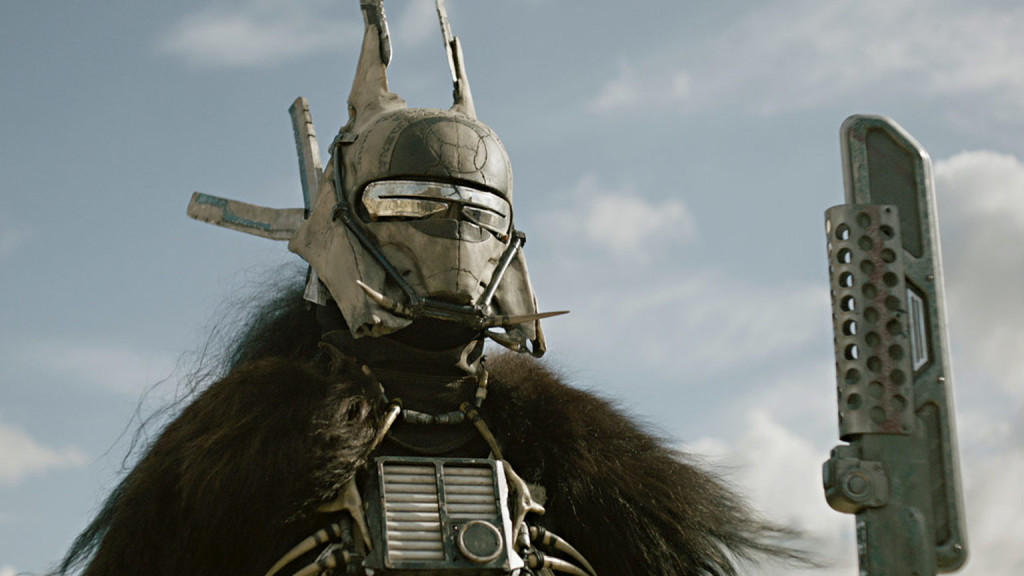DIALOGUE WEEK IS HERE! – All this week, I’ll be breaking down dialogue scenes from movies you love. Monday’s Dialogue Post is here. Yesterday’s post is here.
Today we’re covering a different kind of scene. Admittedly, it’s not the strongest scene of the week. But I picked it because it’s representative of the kind of “workhorse” scenes you’ll be tasked with writing throughout your career. Workhorse scenes are scenes that are saddled with backstory and plot setup. These scenes aren’t generally meant to entertain now. They pave the way so you can entertain later. With that said, you should always TRY to make these scenes entertaining. And Jordan Peele does about as good of a job as you can with this scene under the circumstances.
If you haven’t seen Get Out, it’s about a white girl, Rose, who invites her black boyfriend, Chris, to her rich parents’ (Dean and Missy) home for the first time. This scene takes place 20 minutes after they’ve arrived. Dean has given Chris a quick tour of the house and now everyone has reconvened in the backyard for a drink.
A big reason why this dialogue works has to do with what happened BEFORE THE SCENE. Before the scene, we learn that Chris is nervous to meet Rose’s parents because they don’t yet know he’s black. Also, right before they get here, they run into a deer and have to deal with a racist cop. This further destabilizes an already nervous Chris. Once they get to the house, the parents are sweet. But there’s something “off” about both them and the place.
All of this creates TENSION within the scene which builds subtext into the conversation – Isn’t this dad acting too nice? Isn’t it weird that a white family keeps all black servants? Do the parents like him? — This is the stuff you want, guys. You want conversations to be complicated by other factors. They should never be straightforward and obvious. That’s where boring dialogue thrives.
Let’s move on to the first line. “Rose tells us your parents aren’t with us.” Obviously, Peele wants to use this interaction to give us some backstory on Chris. What I like about this is that it comes about naturally. It’s not a protagonist who, unprompted, launches into the most traumatic moment of his life. He doesn’t get very quiet at the table for no reason until the parents notice. “Are you okay, Chris?” “No, it’s just… this reminds me of my parents is all. They died a few years ago in a fire.” That’s unprompted bush league dialogue.
Nor is this backstory brought up within a scene where it wouldn’t make sense. For example, it doesn’t come up in the car ride earlier. “Are you okay?” Rose asks him. “I’m just thinking about my parents is all. They would’ve liked you. I still can’t believe they died a year ago.” No, it’s brought up within a situation where someone who doesn’t know him asks him.
That’s something a parent might do. Especially a parent who wants to get to know the boyfriend of her daughter. The question is a little aggressive. But it works because of HOW the question is phrased. Notice how she doesn’t say, “What are your parents like?” “Oh, my parents aren’t alive.” “I’m sorry. What happened?” Instead, Missy references something that Rose told her. This allows her to ask the question in a more gentle and natural manner. “Rose tells us your parents aren’t with us.” It’s not even a question really. It’s a statement meant to get Chris talking.
A lot of times dialogue is finding the right combination of words so that the line doesn’t draw attention to itself.
Also notice that Chris doesn’t rattle on about it. This is another mistake writers make. They feel like they need to give this big powerful moment where Chris provides an intense recreation of the worst moment of his life. No. He gives nine lines. That’s it. And even better, those lines are split up. That always makes it more natural, when another character breaks it up. Otherwise you risk an un-asked-for monologue.
The next section is meant to shed more light on our couple’s history. And I like how this is handled. The mom starts pressuring them. Time to get married. Time to have babies. What this does is it shifts our focus more on that pressure than the fact that Peele is clearly sneaking more backstory in. Why do we need that backstory? Because the more we know about our characters, the more we care about them. Which improves any scene during which they’re in danger. You care more about people when you know more about them.
The next two sections of the scene are setup. First, we need to set up the later hypnosis scene. As a writer, this stuff can be annoying. You’re only writing it so that when we get to the hypnosis scene, it makes sense. As a result, there’s a tendency to slap these scenes on the page. Who cares if they’re clunky? They’re just setup. But if you take a little extra time, these moments can define your screenplay. Because if you care that much about the technical beats, we know you care about the big stuff.
“Now, all you have to do is quit smoking,” Rose says. I like the reaction to this line. Dean and Missy HAVE FUN with it. “Oh no! A smoker!?” “And we were just beginning to like you.” A lot of writers believe they have to make a BIG DEAL out of these moments so we remember the scene once the payoff arrives (for example, show Missy and Dean disappointed in Chris). But Peele plays against the obvious. They make fun of him for it. This keeps the scene light while also furthering the narrative that these two (the parents) are a little kooky. From there, we go into Missy’s pitch. And that prepares us for the later hypnosis.
Finally, we set up ANOTHER scenario – the “get-together.” This was a ballsy move by Peele. You usually don’t want to set up two things in one scene. The scene starts to feel like setup porn. I suggest avoiding it if possible but sometimes, in these low-budget movies, you don’t have a choice. With that said, they segue into it pretty smoothly. And that’s the trick with this stuff. As long as you can find that segue line or that invisible transition, you can pull it off.
“If you change your mind… We’re just glad you could join us for the get-together.” That’s better than: “Oh yeah! Guess what? We’re inviting a bunch of friends over tomorrow. I totally forgot to tell you!” This sounds like the writer didn’t have a plan for the scene. The character’s “Oh yeah!” mirrors the writers’ “Oh yeah!” Oh yeah, I have to set this up! Inferring that the party’s already on the schedule gives the impression that both the writer and the characters have everything taken care of.
One more thing I want to say. None of this works unless you have that creepy tension working as subtext throughout the scene. If Peele hadn’t set up a series of moments before this (the all black servants, the too-good-to-be-true-parents, the racist cop encounter, even the first scene in the movie, where the black guy gets kidnapped), then the audience isn’t going to be as patient during a scene that’s 90% backstory and setup. These scenes only work once you’ve got the suspension ball rolling in advance.
What I learned: This is a small hack. But it’s a clever way to bring up a plot point without making a big deal out of it. A lot of writers like to announce plot points like newspaper boys hawking papers in the 40s. “WE’RE GOING TO WAR! READ IT ALL ABOUT IT! DOWN WITH HITLER!” Plot points feel more natural when they’re introduced invisibly. Peele achieves this with the “I forgot” or “We told you about this, remember?” hack. “The get-together?” Chris asks. “The party tomorrow? I told you,” Rose replies. “I must have forgot.” Missy and Dean then provide six lines of info and now, without it having to be this GIANT announcement, the audience knows about the party.
DIALOGUE WEEK IS HERE! – All this week, I’ll be breaking down dialogue scenes from movies you love. Yesterday’s Dialogue Post is here.
I picked this scene not only because this is a great movie. But in interviews with Emily and Kumail, they’re open about the fact that this is their first screenplay. They didn’t even know what they were doing. Now there’s a caveat to this. They had Judd Apatow giving them notes for three years. But they’re still newbies, and this scene is a good representation of a newbie scene mistake that was saved by strong dialogue. The scene takes place after they’ve had sex for the first time (not in the supermarket, in case you thought the above picture was relevant). Let’s read the scene and break down why it works.
The reason this scene is interesting is because it comes on the back end of them having sex for the first time. This is relevant info to newbie screenwriters because dialogue between your romantic leads is always more interesting BEFORE they’ve had sex. Pre-sex scenes allow you to play with sexual tension. And sexual tension can do wonders for dialogue. I’m not saying it’s impossible to write good dialogue right after characters have sex. If there’s ample conflict, such as one character immediately regretting it, there’s great dialogue to be had. But characters sitting around chatting after sex? That’s potentially a boring scene.
Another problem here is that there’s no want. That was my big pitch Thursday. That the best dialogue scenes tend to have one character who wants something and another character who resists. We come into this scene with no ulterior motives. The characters are honest, open, and just want to chat. Dialogue rarely works when you do this. Without want or resistance, there’s no base conflict. Which means you have to find conflict somewhere else. And like I said, they’ve already had sex. So there’s no sexual tension (conflict) to play with anymore either.
But fear not. The writers seem to understand that if they don’t add SOMETHING to the scene, there won’t be any point to it. So they eventually DO introduce a “want.” Emily wants to go home. Kumail resists, wanting her to stay. We finally have our conflict, even if it’s conflict-light. And you’ll notice that the scene rises up a notch once Emily wants to leave. Now you have an action (her leaving) that can be played with.
The lesson here is you don’t need to introduce the “want” right away. You can introduce it later in the scene to change things up.
Now let’s talk about the early part of the scene, and something that separated this romantic comedy from so many others: SPECIFICITY. You can add a level of realism to dialogue exchanges by adding specificity. Read the first four lines in this scene. “What are these scars?” “Oh, they’re a small pox vaccination.” “I thought only old people had those.” “Well I’m from Pakistan. We’re still fighting some battles you guys have already won.”
When was the last time you read anything where small pox was mentioned? In a romantic comedy no less. Why that’s so important is because in four lines, we’ve separated these characters from every other character we’ve seen. That’s specificity. You’re creating a world that’s specific to this experience and this experience only.
That continues throughout the scene. We learn this very specific detail about how Hugh Grant never smiles because it makes him look fat. We learn that Emily was voted “Most Noticeable.” Seems insignificant, right? Well, when you’ve read over 300 scripts where the only time a high school yearbook is mentioned is to place someone in the “Most Popular” category (aka, the most obvious category), you can appreciate the push to give us something different.
How do Kumail and Emily achieve this? Well, they kind of have a secret weapon. They’re writing about their own lives. So (most of) this conversation really happened. That’s a cheat code. Since we’re not always going to be able to write characters based on ourselves, we don’t have this advantage. But you can apply the same approach by inserting specific moments from your own life into your fictional characters’ dialogue where relevant.
Another thing to note is that the dialogue has a certain realism to it. It doesn’t feel overly affected. A big reason for this is that there’s a playfulness during the moments where you don’t typically play. I’ve read scenes like this where amateur writers will play it straight-forward. “You’re leaving already?” “Yeah.” “We’re not even going to…” “We just did.” “I know but… maybe we could do it again?” “I’m tired.” He looks at her, disappointed. “Yeah, okay.”
How much better is, “Wait we haven’t even had sex again yet.” What an awesome first line, right? He brings up something far from guaranteed as if it’s a given with every hookup. “No. No. I’m really not that kind of a girl. I only have sex once on a first date. Plus a hand job.” Another great line. The girl is NEVER supposed to admit to having sex on first dates. But Emily plays right along with Kumail. They then push the joke one step further. “Plus a hand job.” It’s great.
“Well I haven’t had that yet!” She laughs. “You don’t get that because you made fun of me.” “What is happening right now? What are you doing?” “I’m changing under this blanket.” “I’ve seen everything. Do you remember, we were just having sex.” I love this line. It’s something that so many people think but don’t say. We just had crazy wild sex yet you’re dressing in private? It makes zero sense. I call these “truth lines” and they almost always work. When you verbalize the TRUTH, you have hundreds of millions of people who will be able to relate to it. But if Kumail had turned away to be “respectful,” it would’ve read false. Especially with these characters.
The star of this scene, though, is the final joke. “Your driver will be ready as soon as he puts his pants on.” That’s the kind of stuff that’s hard to teach. Because not everyone is clever enough to come up with that joke. But I’ll say this. You can find these jokes if you put the effort in. The first step is not accepting an average joke. That means more trial and error. That means more time spent on the scene as opposed to moving on to the next one. That decision alone separates you from the pack. From there, it’s a matter of asking a lot of “What if” questions.
One way this joke could’ve been discovered is that they knew they wanted Kumail to drive Emily home, but how were they going to do that if Emily didn’t want to be driven home? Well… what if… when Emily called an Uber, Kumail ended up being the driver? It’s never as simple as that. But just by asking “What if?” you come across options other than the most obvious one, which would’ve been Kumail walking Emily to her Uber and saying goodbye.
To summarize, you probably want to avoid a scene like this. No big want. No huge resistance. Very little tension. Very little conflict. Characters sitting around with nothing to do but talk (they aren’t bowling, like yesterday’s characters). Without these tools, a scene becomes exclusively dependent on the writer’s ability to write good conversation.
The writers beat those odds by, first, adding specificity. But more importantly, they had fun with the scene. And you need to have fun in a scene if you’re not offering any dramatic value. Let your character go on for 7 lines on a Hugh Grant tangent. Let them bring up something as random as a small pox vaccination. These are the things that make conversation sound real in a “I’m a human so sometimes random shit comes out of my mouth” way.
What I learned: It’s not what you say. It’s how you say it. If you want to write great lines of dialogue, stop focusing on the WHAT and start focusing on the HOW. Early in the scene, Emily expresses confusion as to why a man living in the 21st century would have small pox scars. “Well I’m from Pakistan,” Kumail says. “We got the small pox vaccination late.” Okay, that’s not really what he says, is it? No. Because this is the WHAT version of the line. It’s straight forward info and therefore lands with a thud. Kumail and Emily the writers search for HOW to say this line so that it lands with more pop. “We’re still fighting some battles you guys have already won.” So much better right!? If a line isn’t popping, it may be a WHAT line. Make it a HOW!
DIALOGUE WEEK IS HERE! – All this week, I’ll be breaking down dialogue scenes from movies you love.
I thought a lot about how I was going to frame this week’s entries and I decided that the best way to go about it was to present a scene from a well-known movie, post that scene so we could all read it, then go through all of the creative and technical reasons why the scene resulted in good dialogue. If you have suggestions for tweaks, share them in the comments.
The Coen Brothers were an easy choice for Day 1. They have a number of scripts with numerous high-quality dialogue scenes. I’ve talked about this scene from The Big Lebowski before but I love it so I’m going to talk about it again!
The scene in question takes place after our hero, “The Dude,” a meandering 40-something eccentric, endures a break-in where three thugs mistake him for a rich man with the same last name. They threaten him, rough him up, and to send a message, piss on his rug. The following scene takes place the next night, with The Dude partaking in his weekly bowling game with oddball friends, Walter, a fast-talking war vet, and Donny, a clueless idiot.
Hopefully you read Thursday’s Dialogue Prep article. If you didn’t, go back and read it now because that’s the first thing I want to talk about. This scene from The Big Lebowski does contain the requisite “want” and “resistance” most good dialogue scenes have. The Dude WANTS to figure out what to do about these guys who screwed up his rug. And Walter provides the RESISTANCE, telling The Dude he is focusing on the wrong damn thing.
There’s a tweak in the formula, however. A scene typically works best when the primary character wants something from the other character in the scene. But The Dude doesn’t want anything from Walter (or Donny). He wants something from the guys who broke into his house. As such, The Dude is sort of talking out loud. His want is a blanket question to which he’s trying to find a solution. In that respect, Walter’s resistance isn’t necessary. He doesn’t have anything riding on this. But he’s offering that resistance nonetheless.
The reason this still works, however, is that the setup results in CONFLICT. Remember that conflict is where dialogue pops the most. This is why Walter’s resistance is so important. If he doesn’t resist The Dude’s train of thought, there’s no conflict. It’s just two people agreeing with each other. And that’s boring. The big lesson learned here, then, is that as long as you find that conflict between the characters, you can tweak the formula.
Another thing I love about this scene is Donny. I often talk about how third characters can be a secret weapon in scenes. A third person adds an element of uncertainty to the dialogue. If two people are simply exchanging turns talking, dialogue gets monotonous. Creating this third character who’s always two beats behind everyone else is a genius move because now, not only do we have our classic “want and resist” scenario. But we’ve got these wild-card chunks of dialogue thrown into the fray that wreak havoc on the conversation. “What tied the room together. Dude?” “What the fuck is he talking about?” “His name is Lebowski? That’s your name, Dude!”
Another huge reason this dialogue is so strong is that it contains a “Dialogue Friendly” character. If you’re new to the site, “Dialogue Friendly” refers to the kind of character who’s built to have memorable dialogue. These tend to be characters who are witty, clever, eccentric, manic, boisterous, philosophical, talkative, weird, etc. This is one of the most overlooked reasons for bad dialogue. Writers have written boring/introverted/reserved characters into their story and then wonder why none of them ever says anything interesting.
Walter is possibly the most dialogue friendly character you’ll find. He’s crazy. He loves the sound of his own voice. And he’s perfectly happy offering his opinion on things. I mean, let the great dialogue roll: “Were you listening to the Dude’s story?” “I was bowling—“ “So you have no frame of reference, Donny. You’re like a child who wanders in the middle of a movie and wants to know—“ To understand the value of this line, consider that a non-dialogue friendly character probably would’ve said, “Then shut up.” Which is a line we’ve heard a million times before.
Realism. Realism is something I don’t talk about a lot on the site. But this dialogue is a good example of it. Notice how “in the moment” the conversation is. For example, Walter cuts himself off mid-sentence to follow another thought. “What the fuck are you talking about?! This Chinaman is not the issue! I’m talking about drawing a line in the sand, Dude. Across this line you do not, uh–and also, Dude, Chinaman is not the preferred, uh. . . Asian-American. Please.”
I find that writers spend so much time polishing their dialogue so that every line is the screenwriting equivalent of the Mona Lisa, that they lose that “in the moment” quality. In the moment is messy. It’s dirty. It’s the kind of place where characters can change their line of thought mid-sentence.
On top of that, everyone’s cutting each other off, talking over each other. There are a lot of dashes at the end of sentences. For newbies, when you want someone to cut someone else off or talk over them, you add two dashes. Not ellipsis (three dots). I know immediately I’m dealing with a beginner when I see this mistake.
Also, the characters are all DOING something (bowling) while they’re talking. What they’re doing is pretty insignificant. But it made the dialogue more interesting than if, say, the scene had taken place back at The Dude’s apartment with everyone standing around. When you have your characters somewhere DOING STUFF, it often provides new ideas and directions to take the dialogue that you wouldn’t have thought of before.
For example, maybe an early version of this scene had these three discussing the matter cohesively. Then either Joel or Ethan thought, “Wouldn’t it be funny if Donny’s off bowling so he comes into the interaction late, leaving him to play conversation catch-up the whole time?” And hence we get a much funnier version of Donny than we would’ve had these three NOT been at the bowling alley.
One final observation. It’s a small one, but I think it’s worth talking about. I love this little thread about how great the rug was. “That was a valued rug,” is the first thing that Walter says. “Yeah, man, it really tied the room together,” The Dude replies. “What tied the room together, Dude?” Donnie butts in. Then later, Walter goes back to that well, “That rug really tied the room together, did it not?” Technically, none of this needs to be discussed. You could’ve easily written the scene like this…
“I can’t believe he did that to my rug.” “You need to get him back. That’s what you need to do.” “But how. I don’t even know who these guys are.” “Screw those guys. Go after the guy with your name. Lebowski. He should be paying you back for that rug.” “That’s not a bad idea.” “I know. Now let’s bowl. I’m feeling good tonight.” Walter confidently struts up and bowls a gutter ball.
Notice how I could insert this scene for the one the Coens wrote and it would still TECHNICALLY get the job done. Relevant plot points are hit. We know what needs to happen next. But it’s missing stuff like the tangent thread I just highlighted. And the talking over each other. And the third guy butting in. And cashing in on your dialogue-friendly character. And that’s probably the point we should leave on. Is that when it comes to dialogue, it’s never ONE THING that makes the scene. It’s a combination of things. That’s definitely the case with this scene from The Big Lebowski.
What I learned: Use your environment to improve the dialogue in your scene. If there’s nothing in the immediate environment that can achieve this, consider moving the scene to a different environment. I love how the simple act of bowling his turn places Donny behind the conversation by a few beats, which in turn provides several great jokes within the interaction.
Carson does feature screenplay consultations, TV Pilot Consultations, and logline consultations. Logline consultations go for $25 a piece or 5 for $75. If you’re interested in any of these consultation packages, e-mail Carsonreeves1@gmail.com with the subject line: CONSULTATION. Don’t start writing a script or sending a script out blind. Let Scriptshadow help you get it in shape first!
Genre: Sci-Fi Adventure
Logline: After getting split up from the love of his life, a young and brash pilot joins a group of smugglers and attempts to pull off the heist of the century.
About: Maligned from the moment film started passing through the gate, the Solo Star Wars movie was on a Death Star sized collision with disaster. Now the stuff of legend, Kathleen Kennedy fired the original directors of the film, Phil Lord and Chris Miller, because they were so slow she didn’t believe they could finish the movie on time, then brought in journeyman director Ron Howard to shoot 70% of the film in 3 months. Sounds like a legit story to me! When you throw on a heaping of “Alden Ehrenreich can’t act,” or so the rumors went, it’s a miracle this movie actually made it to theaters. The Solo script was written by the man who understands the character the best, Empire Strikes Back writer Lawrence Kasdan, along with his son, Jon Kasdan, because why not.
Writers: Lawrence & Jon Kasdan (based on characters created by George Lucas)
Details: 2 hours and 15 minutes
There’s only one question to ask before diving into Solo.
Is it time to fire Kathleen Kennedy?
Between all the Star Wars productions she’s screwed up, the endless number of Star Wars side stories and trilogies she keeps randomly greenlighting, and stating that her proudest achievement is the movie that destroyed the most iconic movie hero of the past 50 years, I’d say it’s time to go.
However, I will say this.
She pulled a rabbit out of the hat on this one. Solo is a good movie. It’s not a great movie. But it’s a good movie.
The script follows a young Han Solo on his dirty grimy planet of Correlia, where he’s fallen in love with a beautiful young woman, Kira (it’s really “Qi’ra” but that’s super annoying to write so I’m going to go with Kira). The two plan to con their way onto a ship and fly away together, but get split up at the spaceport.
Han vows to make enough money to go back and retrieve Kira, and so when he meets a dodgy smuggler, Beckett, who’s got a high-paying job, Han is all in.
That job, a train robbery, doesn’t pan out. And Beckett reveals that the gig was actually his way to pay back big-time gangster Dryden Vos. Without the loot, Dryden will find and kill them.
Han’s got a plan. They’ll get the loot from another planet – the spice mines of Kessel – and pay him back that way. In a twist of fate, Kira now works for Dryden, who sends her along with Han and Beckett (and later, Lando Calrissian), to make sure they complete the job.
The first thing that comes to mind when evaluating Solo on a screenwriting level is stakes. They are way lower than any previous Star Wars movie. The only thing at stake is our characters’ lives and while your life is a big deal in the real world, the movie world is different. Movies are larger than life. That’s why we go to see them. So unless we’re watching the Sundance Grand Jury Prize runner-up, we tend to want more.
This definitely affects Solo because as the movie pushes towards its finale, it feels like it’s flatlining. And that’s because there isn’t a big giant “thing” to defeat.
[starts getting spoilery]
To the Kasdans’ credit, they realize this, and they go all in on a character-driven climax. The whole thing takes place in a room with five people. It turns out that Beckett double-crossed Han and maybe Kira did too. Han tries to talk his way out of it, and we continue to get a series of twists and turns until both Beckett and Voss are dead.
Now here’s the thing about this type of climax. It CAN work. But it only works if the characters are firing on all cylinders. Every character needs to be reaching the pivotal moment in their arc. Han, Kira, and Beckett all did a decent, if unspectacular, job. The problem was Dryden Voss. He just doesn’t stand out. He’s neither super scary or super unique or super interesting. He’s just sort of a guy.
Your villain represents the negative energy in your story. If that energy is in any way muted, your climax isn’t going to pop. Let me explain that in more detail because it’s important. For a climax to work, the negative energy must be stronger than the positive energy. The reason for this is that you need the audience to DOUBT that our hero will succeed. That’s what creates the rush of emotion when they win. Because they overcame something you didn’t think they would overcome.
I didn’t see anything in Dryden Voss that made me think he was smarter or more equipped than our good guys, so I never got that feeling. And that’s why, even though it was admirable that they made the climax character-driven, it didn’t work.
Moving on to this incarnation of Han Solo.
These writers had a near impossible assignment. They had to build a character towards the character we know at the beginning of Star Wars A New Hope, but they could only build him one-third of the way, since they were planning to do a Han Trilogy.
How do you build a character one-third of the way towards anything? It’s impossible. And it forces you to create this muted dialed-down character arc. Which, in turn, creates a muted dialed-down character. I’m not even sure what Han’s flaw was in this movie. I think they were trying to make him trusting and naive, and this journey was supposed to teach him that you can’t think that way. But again, you should still kinda think this way because we still got two movies to go?
The character remains fun, and his charm masks some of what’s missing underneath. But the lack of a definitive belief system in Han makes him wishy-washy, and therefore he’s hit or miss.
The plotting has a similar quality. They opt to do a “two-goal” approach to the narrative. The first goal is to steal energy cells from a train. Once that fails, it’s to get energy from the planet Kessel. I have no problems with this approach. I actually think it’s good. If the whole movie focused on one goal – Kessel – it’ll be stretched too thin. With two goals, each goal moves on a tight timeline.
Clearly, they were hoping to make the Kessel Run the star of the movie. That’s the big action-packed sequence.
Unfortunately, they botch it.
The mission they set up, while a little complicated, is actually clever. They’re stealing unrefined energy from Kessel. Unrefined energy needs to be refined quickly or else it becomes unstable. So after they steal the energy, they have to get it to a refinery quickly or else it will blow. This is why Han needs to do the Kessel Run so quickly (as he famously brags about in Star Wars A New Hope).
But then they screw it up. For one, they don’t keep tabs on the energy cells. We should be seeing bars getting lower and lower signaling that these things are going to blow. But outside of one brief glance at the cells, we never see them again.
In addition, we’ve been hearing about how quickly Han did the Kessel Run all these years. So why do we keep stopping and slowing down while it’s happening? I thought in order to do something fast you needed to go fast. At one point they’re getting sucked into a vortex for five minutes.
The last problem is more of a filmmaking one but I had no basis for what I was looking at with the Kessel Run. We’re in these gassy clouds with giant – I don’t know – mini-planets everywhere? At a certain point I started wondering if we were even in the Kessel Run or we were still on some gassy edge of Kessel or we were in some pre-Kessel Run runway area. It was super confusing.
And that starts with the writing. You have to make sure when you’re constructing an elaborate set-piece that happens in an unfamiliar space with unfamiliar elements that you create a visual plan that makes sense. This is why the Death Star run remains one of the greatest set-pieces ever. It’s so easy to understand. They go down into the trench until they get to the end.
And that sucks because that’s the last big action scene in the movie. So we leave that feeling let-down, confused. And then we’re not sure if we’re going to get another last-minute set-piece. So when we don’t, we feel like… that’s it?
A Star Wars movie should never end on “That’s it?”
Okay, what’s left? Lando was a let-down. I don’t know who’s asking for a Lando film after that performance. That droid was annoying as hell. Chewbacca was awesome. I really liked the alien that Jon Favreau played. Of course he dies early. Great job there, getting rid of one of the only memorable characters. Kira was… I don’t want to say lame. But she didn’t leave an impression. Oh, and what was going on with Enemss Nest or whoever that other pirate was? There’s this dramatic moment where they finally take off the helmet and you’re thinking… what? Boba Fett? No. It’s just some random 20 year old chick with freckles. I’m like who the hell is this chick?? Talk about a letdown.
Okay, now let’s get real. And spoilery. And nerdy.
The big shocking reveal at the end. Darth Maul.
I am a huuuuuuuuuuuuuuuge fan of Darth Maul. I believe his death was one of the single biggest mistakes in the prequels. George Lucas failed on such an epic scale to create interesting characters in those movies. And the ONE character with presence in the movie, Darth Maul, he kills off. It just goes to show how out of touch Lucas was when he made those films.
To bring Maul back is really a statement that’s saying, in the boldest way possible, “You effed up, George. And you effed up so bad that we’re going to forcefully correct your mistake.”
And it’s a good choice because the big problem with this script was the lack of a compelling villain. Both villains in the film were lame. This would ensure that if they made a second film (and I know it’s a big if) that problem would be solved. Because you’d have Jabba the Hut and you’d have Darth Maul. And that would get me to the theater in a heartbeat.
Anyway, this was a fun moviegoing experience. It was a thousand times more enjoyable than my last Star Wars experience, that’s for sure. Check it out, yo.
[ ] What the hell did I just watch?
[ ] wasn’t for me
[x] worth the price of admission
[ ] impressive
[ ] genius
What I learned: It’s so hard to create great characters. 95% of the characters created in movies are forgettable. So when you experience that rare feat of magic of writing a character that’s popping off the page… DON’T KILL THEM OFF. Why would you kill a character off who’s working better than the characters you keep alive? Let the deaths of Jon Favreau’s character in Solo and Darth Maul in Episode 1 be a friendly reminder to keep your awesome characters alive!
Schedule Change Alert! – Tomorrow, I’m reviewing Solo. Monday, Memorial Day, I’ll be off. Tuesday-Friday will be Dialogue Week. That pushes the Amateur Offerings Winner to June 8th.

As we get ready for Dialogue Week, I want to remind you of the basics. Because in order to write good dialogue, you have to first set up a situation that allows good dialogue to be written. The majority of the time, this will boil down to one law:
One character in the scene needs to want something. Another character in the scene needs to resist.
There’s a reason for this. You need “want” in a scene to give the scene direction. If someone doesn’t want anything, then why would we care what they say? In the same way a goal gives your character reason to act. A “want” gives your character reason to speak. The reason you want the other character to be resistant is because this creates CONFLICT in the conversation. And conflict is where dialogue is the most charged.
A simple version of this is a nerdy high school kid going up to ask a popular girl to prom. These scenes almost always work and the reason is that the dialogue “pedestals” holding the scene up are so sturdy. Character A wants something. Character B doesn’t want to give it to him. This is the secret nature of good dialogue. Even if you don’t dress this scene up with Diablo Cody like word magic, it’s still going to work because the situation is so strong.
On the flip side, if you write a scene where two friends get together to have coffee, and neither of them wants anything from the other, chances are the scene’s going to be boring. Audiences have a threshold for listening to conversations that don’t go anywhere, and it’s getting shorter every year. This is why, whenever you see a scene like this, it almost universally segues into, “I need your help with something.” Or the other character might say, “What do you want?” “What do you mean?” “You never ask me to coffee unless you want something. So what is it?” The scene then segues into the proper format for good dialogue. Want + resist = conflict = charged dialogue.
It’s also important to note that a “want” doesn’t have to be on the surface. In fact, most writers will tell you that it’s better if it isn’t. For example, let’s say a married couple who haven’t had sex in awhile are having a dinner night. The husband is hoping to get lucky. The wife isn’t. So the husband has put together this really romantic dinner in the hopes of convincing her.
Of course, he doesn’t say this out loud. He’s just hoping to spark the mood. So you have your want (to get lucky) and you have your resistance (she doesn’t want to). Therefore, when they talk about their day or how good the food tastes or that annoying co-worker, the dialogue’s still charged because we know what’s going on underneath that conversation.
Out of curiosity, I threw on Jumanji: Welcome to the Jungle to see if it adhered to this rule. It’s a movie that has a lot of fun dialogue so it seemed like a great test bed. Indeed, it follows it closely. Here are the first seven scenes…
1) Spencer’s mom WANTS to make sure he has everything for the day. Spencer is upset that his mom busted in on him and is invading his space.
2) Fridge’s mom WANTS to make sure her son is studying so he doesn’t get cut from the football team. Fridge is elusive and assures her he’s fine.
3) Spencer uses the favor of doing Fridge’s homework to ask him if he WANTS to hang out this weekend. Fridge resists.
4) A scary old man from the nearby house WANTS to know what Spencer is doing there. Spencer resists, apologizes and walks away.
5) A teacher WANTS to know why Bethanny is on her phone during a quiz. Bethanny resists by saying she deserves to finish the call, ultimately leading to detention.
6) The gym teacher WANTS Martha to join the activities. Martha resists, giving her several reasons why gym is stupid.
7) The principal calls Spencer and Fridge into his office. He WANTS to know if they cheated. The two are elusive at first, but eventually Spencer cops to it.
I want to make something clear. Dialogue doesn’t fit into this perfect formula every time. Just most of the time. And that was on display in Jumanji as well. For example, after Spencer and Fridge leave the principal’s office, they start arguing with each other. There’s no apparent “want” here. It’s more of a reaction to something that already happened. But there was CONFLICT, which is why the dialogue still popped. It’s going to be fun discovering more of these variations next week.
But this is your starting point. Make sure a character wants something. Have there be some level of resistance from the other character, and you’re bound to write, at the very least, DECENT dialogue. As for writing great dialogue? Well, gosh-darn, you’ll just have to wait until next week for that. :)

